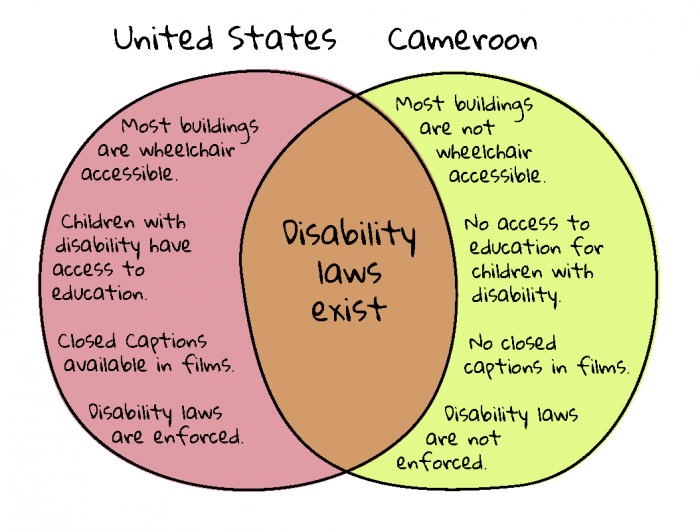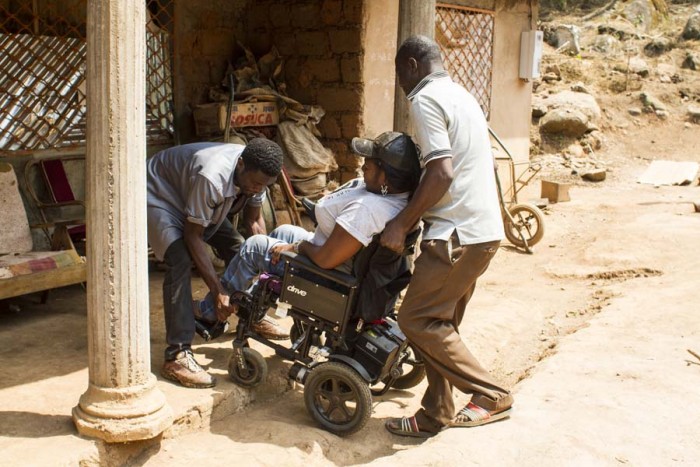July 21st, 2015 by Rachel | Tags: Disability, Peace Corps | No Comments »
Americans with Disability Act went into effect exactly 25 years ago, on July 26, 1990. In honor of ADA’s 25th birthday, I would like to share the differences in disability rights between my home country, United States, and Cameroon. It’s important to note that while the United States was the first country in the world to enact disability laws, the United States continue to be one of the fewest countries in the world to have laws that protect persons with disability and enforce the laws. As Cameroonians with disability will tell me on regular basis, the United States is a model for other countries on how to provide persons with disability with equal access. While Cameroon does have disability laws, which was enacted in 2010, they exist only on paper. They are not enforced.

In the United States, everywhere we go, there are many visual aids giving us awareness that persons with disability do exist and they deserve live a fulfilling life. At every parking lot, there is always at least one or a few handicap signs informing the population that those parking spaces are reserved for people with mobility disability or any kind of disability that prevent them from walking long distance. Many doors to the stores and public buildings open automatically when it detects a person is by the door so that people who use the wheelchair or crutches do not have to struggle to open the door. The public bathrooms have at least one stall that is big enough to fit a wheelchair. The same big stalls for wheelchair users also have bars to help wheelchair users get in and out of the wheelchair safely. It’s also for elders with weaker legs to help them stand up without falling down. Many buildings have strobe lights so that deaf people can know that the fire alarm is going off as many can’t hear the sirens. Buildings that have stairs also have a ramp so that those with mobility disability can access the buildings. All buildings that have more than one floor have at least one elevator so that people with mobility disability can access to other floors. Many theaters will have signs stating that they have headphones for hard of hearing so that they can hear the movie or play clearly.

Hilda Bih enters in a building with a help of two men as the building is not wheelchair accessible.
All of these visual aids showing the importance of accessibility for persons with disability are very rare in Cameroon. Some banks in Bamenda where I am posted have ramps but almost all other places do not have ramps. I have not spotted one parking lot in Bamenda or Yaounde that has spaces reserved for wheelchair users. No public bathrooms has a stall big enough to fit a wheelchair or a bar. No buildings has a strobe light. I don’t think there is even a fire alarm in almost all buildings. I have not seen one elevator in any buildings with more than one floor except for the Peace Corps Cameroon headquarter in Yaounde. Because I have not been to a theater in Cameroon as they do not exist anywhere except for probably in Douala, I cannot say if they do provide headphones for hard of hearing or not.
As I have mentioned in the previous blog posts, another major difference is education. The United States’ ADA ensures that all children with disability have access to education. Most public schools are equipped with resources to ensure that children with disability can learn along with peers without disability and reach to their fullest potential. This is not the case in Cameroon. Almost no regular schools are equipped with resources which is one of the reasons why only 2% of Cameroonians have gone to school.
While 55.8% of persons with disability aged between 16 and 64 years are employed in the United States, most persons with disability in Cameroon do not have a job. In fact, majority of persons with disability in Cameroon are the poorest of the poor. ADA ensures that workplaces do not discriminate persons with disability by not refusing to hire them due to stigma.
While Cameroon may be so far behind in providing equal access to persons with disability, there are a number of strong persons with disability who are advocating tirelessly for improved rights.
